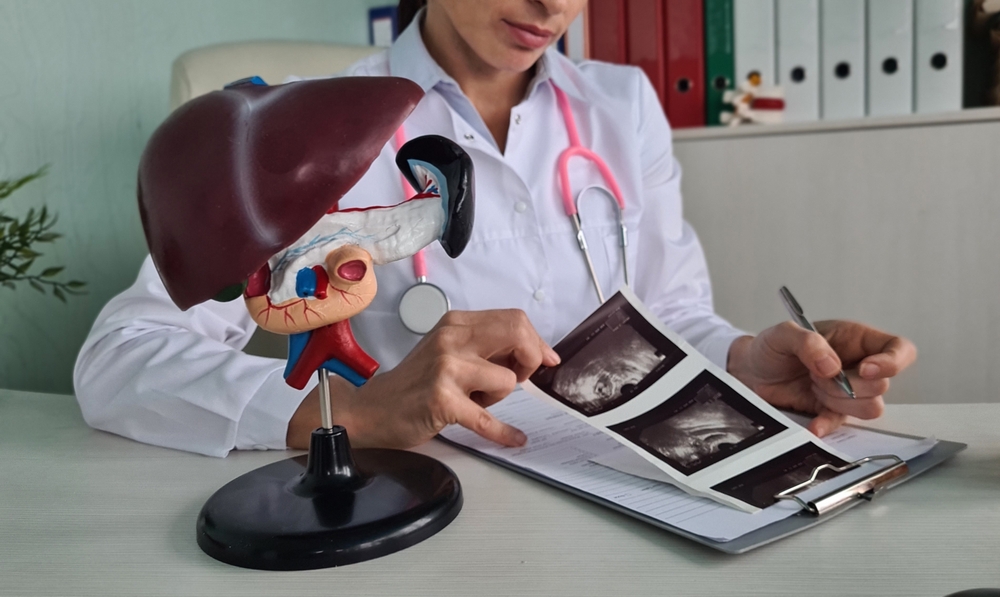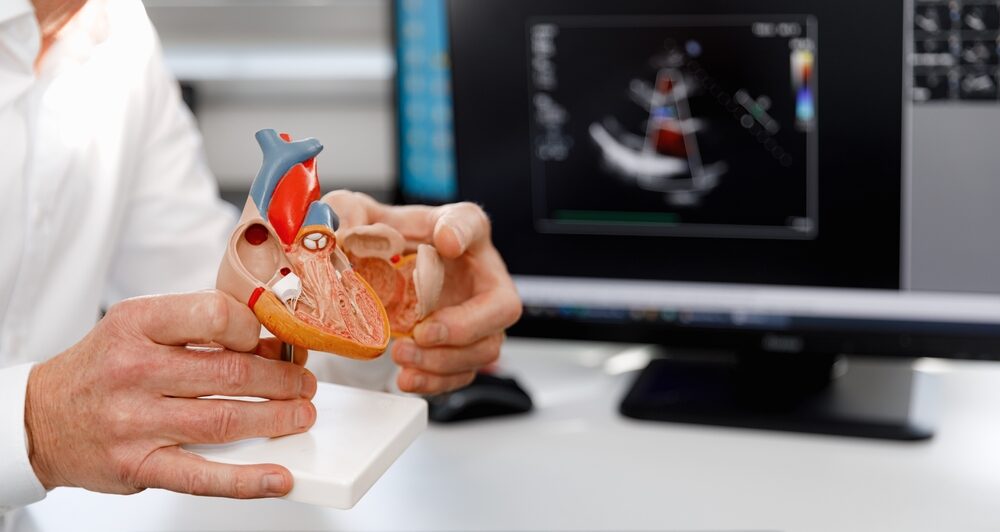
☝️ The most important facts in brief
- Internists are specialists in internal medicine and treat diseases of the internal organs such as the heart, kidneys and gastrointestinal tract.
- Training to become an internist involves six years of medical studies and five years of training to become a specialist in internal medicine.
- An internist is responsible for the prevention, diagnosis and treatment of diseases and can be employed in a variety of ways, for example in a clinic or in their own practice.
- The starting salary for internists is around 6,500 euros.
📖 Table of contents
As a specialist in internal medicine, an internist deals with many different internal diseases. For example, they look after patients who have problems with their heart, gall bladder or kidneys. The specialist field of haematology is also one of the areas of responsibility of an internist who has undergone at least 5 years of additional training after completing their studies.
Are you interested in studying medicine?
We will be happy to advise you free of charge about your options for studying medicine, including advice on studying medicine in another EU country, which is fully recognised in Germany.
Internists are real "all-round doctors"
As a specialist in internal medicine, you have to cover a wide range of medical services. But what exactly is an internist? To generalise a little, internists are medical specialists who specialise in the diagnosis and treatment of diseases of the internal organs.
While the work of a doctor in many other specialities is clearly limited to a comparatively small area, an internist seems to do almost everything: an ophthalmologist focuses on the eye, an ear, nose and throat specialist on the upper respiratory tract and a neurologist on the nervous system. A specialist in internal medicine deals with cardiovascular diseases, disorders of the gastrointestinal tract, diabetes mellitus, diseases of the urinary tract and much more. If you realise this, it quickly becomes clear that as an internist you need particularly comprehensive specialist training, because your area of expertise is vast.
The various specialities of internal medicine
Many internists specialise in one area during their specialist training or at a later stage. However, as a specialist in a particular field, you must also be familiar with the other specialisations. The following list shows some of the main areas in which you work as an internist:
- Cardiology: Diseases of the cardiovascular system and corresponding treatments.
- Gastroenterology: From simple stomach flu to more complex diseases of the digestive organs, everything that affects the digestive tract.
- Nephrology: Diseases of the kidney and urinary tract
- Hepatology: Liver and bile ducts and associated therapies
- Endocrinology: Hormones and metabolic disorders fall under the speciality of endocrinology.
- Haematology: Blood and haematopoietic organs.
- Pneumology: Diseases of the respiratory organs such as asthma and COPD.
- Rheumatology: Rheumatic diseases of the body such as arthritis fall under this speciality
Further training takes longer with a specialisation
Further training to become a specialist in internal medicine usually takes five years. However, if you would like to add a specialisation such as cardiology or gastroenterology, the training period will be extended.
Specialisation requires additional experience and knowledge in the relevant specialist areas. An internist with a specialisation can diagnose complex diseases even more reliably and treat them accordingly.
The extra years of training enable you to provide patients with the best possible care and offer specialised treatments. For many doctors, extra training is also a springboard for their career, for example if they want to become a senior physician or head physician at an internal medicine clinic.
The tasks are expanding, and as a specialist you will often be consulted by internists and doctors from other specialities when they need a competent assessment or treatment plan for their patient.

What distinguishes an internist from a general practitioner?
Both internists and general practitioners often work as family doctors. The fields of activity of these two medical specialities therefore overlap. Both specialists provide comprehensive patient care and prevention.
However, the structure of specialist training and the specialisations also differ in key areas. For example, internists focus on the internal organs, while general practitioners do not go into quite as much depth as their colleagues during their training. General practitioners have probably learnt more about neurology, geriatrics and emergency medicine during their training.
However, both doctors are well suited to the profession of family doctor and have the basic skills required for this.
In case of doubt: refer to the right specialist
No doctor can be perfectly versed in all specialisms. It is therefore important for both GPs and doctors working in hospitals to recognise this. In case of doubt or if specialised treatment is necessary, the patient should therefore be referred to a suitable specialist.
As a specialist in internal medicine, you will undergo intensive training covering a wide range of specialist areas, but it is not possible to specialise in everything. This is why interdisciplinary collaboration with other doctors is particularly important as an internist.
How do you become a specialist in internal medicine?
If you want to work as an internist, your path begins with a comprehensive medical degree, followed by intensive specialist training specifically designed to enable future internists to diagnose and treat diseases of the internal organs such as the heart, kidneys and digestive organs.
After completing your training, you have the opportunity to work as an internist in a clinic or to open your own practice.
The study programme
The medical degree programme usually lasts six years and includes theory and practice in almost all specialist areas. The degree programme is divided into three main areas:
Preclinic
In the pre-clinical part, you will familiarise yourself extensively with the human body and its functions. Anatomy, physiology and biochemistry are among the most important subjects here.
Clinic
The clinical part is more about the teaching of diseases, examinations and treatment. You will continue to be trained as a doctor in all areas, which is also very important. After all, as an internist you will need to know what to do, for example, if your patient is suddenly affected by functional deficits in the nervous system, even if this actually falls under the specialism of a neurologist.
Practical year
During your practical year, you will carry out medical activities at a clinic, but will still be closely supervised by trained doctors and teaching staff.
This will give you a good insight into everyday life in the clinic, from examination to initial treatment.
As you will also be working in an internal medicine clinic for 3 months during your practical year, you can already start to think about whether internal medicine is the right profession for you.
The practical year is followed by the state examination. If you pass this, you can start as an assistant doctor at a clinic and begin your further training to become a specialist in internal medicine.
Specialist training
The actual training to become an internist now takes at least another 5 years.
During your time as a junior doctor, you will acquire additional knowledge and skills that you will need as an internist. Further training covers all areas of internal medicine, from gastrointestinal diseases and arterial occlusive disease to diseases of the kidneys and other organs.
Your own practice?
After studying and training as a specialist in internal medicine, you have the opportunity to become self-employed. Having your own practice offers you many opportunities as an internist.
Just like in the clinic, you will also treat patients with diseases of the internal organs such as the heart and kidneys in your own practice. Your tasks include examinations, diagnosis, treatment and aftercare. Gastrointestinal diseases, metabolic disorders and hormonal disorders are common topics for internists in private practice.
The difference to working in a clinic is that you usually know your patients over a longer period of time.
As an internist in private practice, prevention, prophylaxis and rehabilitation are more important than when working in a clinic, where the focus is usually on current cases and urgently needed treatments.
What do internists earn?
As an internist, you are an expert in internal diseases and therefore earn more than a junior doctor without this additional qualification.
In your first year as an internist at a clinic, you can expect gross earnings of around 6,500 euros per month count. The salary can also increase with increasing professional experience.
If an internist undertakes additional training and becomes a senior consultant in gastroenterology, for example, the salary increases significantly.
If you decide against a career in an internal medicine clinic and in favour of your own practice, even higher earnings are possible. However, it is important to bear in mind that a practice also entails corresponding costs and risks.
Free information material
Studying medicine abroad 🎉
Order your info pack now, find out more about the Studying medicine abroad and get started as a medical student!





